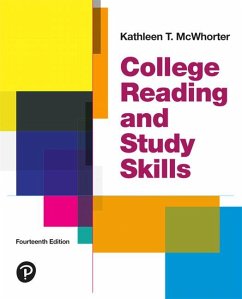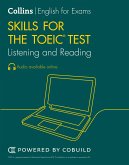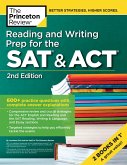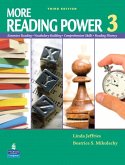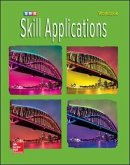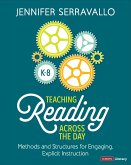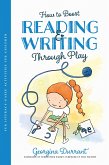- Broschiertes Buch
- Merkliste
- Auf die Merkliste
- Bewerten Bewerten
- Teilen
- Produkt teilen
- Produkterinnerung
- Produkterinnerung
For courses in Intermediate Reading (9-12 grade level) and Reading and Study Skills. Presents reading and studying as inseparable skills, key to success in college and beyond With a focus on direct instruction, College Reading and Study Skills provides complete coverage of both reading and study skills while demonstrating their relationship and interdependency. The 'McWhorter Way' encourages students to approach reading and study skills as methods of selecting, processing, and organizing the information to be learned. The text also covers time management, analysis of learning style,…mehr
Andere Kunden interessierten sich auch für
![TOEIC Listening and Reading Skills TOEIC Listening and Reading Skills]() TOEIC Listening and Reading Skills27,99 €
TOEIC Listening and Reading Skills27,99 €![Reading and Writing Prep for the SAT & Act, 2nd Edition Reading and Writing Prep for the SAT & Act, 2nd Edition]() Review PrincetonReading and Writing Prep for the SAT & Act, 2nd Edition20,99 €
Review PrincetonReading and Writing Prep for the SAT & Act, 2nd Edition20,99 €![More Reading Power 3 Student Book More Reading Power 3 Student Book]() Beatrice S. MikuleckyMore Reading Power 3 Student Book39,99 €
Beatrice S. MikuleckyMore Reading Power 3 Student Book39,99 €![Corrective Reading Decoding Level C, Workbook Corrective Reading Decoding Level C, Workbook]() McGraw HillCorrective Reading Decoding Level C, Workbook39,99 €
McGraw HillCorrective Reading Decoding Level C, Workbook39,99 €![Teaching Reading Across the Day, Grades K-8 Teaching Reading Across the Day, Grades K-8]() Jennifer SerravalloTeaching Reading Across the Day, Grades K-838,99 €
Jennifer SerravalloTeaching Reading Across the Day, Grades K-838,99 €![A Short Course in Teaching Reading A Short Course in Teaching Reading]() Beatrice S. MikuleckyA Short Course in Teaching Reading63,99 €
Beatrice S. MikuleckyA Short Course in Teaching Reading63,99 €![How to Boost Reading and Writing Through Play How to Boost Reading and Writing Through Play]() Georgina DurrantHow to Boost Reading and Writing Through Play28,99 €
Georgina DurrantHow to Boost Reading and Writing Through Play28,99 €-
-
-
For courses in Intermediate Reading (9-12 grade level) and Reading and Study Skills. Presents reading and studying as inseparable skills, key to success in college and beyond With a focus on direct instruction, College Reading and Study Skills provides complete coverage of both reading and study skills while demonstrating their relationship and interdependency. The 'McWhorter Way' encourages students to approach reading and study skills as methods of selecting, processing, and organizing the information to be learned. The text also covers time management, analysis of learning style, note-taking strategies, improving vocabulary, and strengthening critical comprehension GÇö elements crucial to student success. The 14th Edition revises and expands its coverage of the digital age in the context of reading and study; it features a stronger emphasis on discipline-specific college reading and expanded coverage of critical thinking. The thematic reader now covers non-traditional addictions and discrimination. Also available with MyLab Reading MyLabGäó is the teaching and learning platform that empowers you to reach every student. By combining trusted author content with digital tools and a flexible platform, MyLab personalizes the learning experience and improves results for each student. Learn more about MyLab Reading.
Hinweis: Dieser Artikel kann nur an eine deutsche Lieferadresse ausgeliefert werden.
Hinweis: Dieser Artikel kann nur an eine deutsche Lieferadresse ausgeliefert werden.
Produktdetails
- Produktdetails
- Verlag: Pearson Education (US)
- 14 ed
- Seitenzahl: 496
- Erscheinungstermin: 22. Januar 2019
- Englisch
- Abmessung: 216mm x 276mm x 22mm
- Gewicht: 1032g
- ISBN-13: 9780134996295
- ISBN-10: 0134996291
- Artikelnr.: 61594519
- Herstellerkennzeichnung
- Libri GmbH
- Europaallee 1
- 36244 Bad Hersfeld
- gpsr@libri.de
- Verlag: Pearson Education (US)
- 14 ed
- Seitenzahl: 496
- Erscheinungstermin: 22. Januar 2019
- Englisch
- Abmessung: 216mm x 276mm x 22mm
- Gewicht: 1032g
- ISBN-13: 9780134996295
- ISBN-10: 0134996291
- Artikelnr.: 61594519
- Herstellerkennzeichnung
- Libri GmbH
- Europaallee 1
- 36244 Bad Hersfeld
- gpsr@libri.de
About our author Kathleen T. McWhorter is the author of more than a dozen textbooks designed to help students succeed in college. Born in a rural farm community in Upstate New York, she went on to receive her EdD from SUNY Buffalo. For 34 years, she taught at Niagara County Community College in Sanborn, NY, where she is a professor emerita of humanities. Through her textbooks, Dr. McWhorter has helped an estimated 500,000 students improve their reading, writing and critical-thinking skills. For more information on Kathleen's Reading and Writing Series, visit the McWhorter Way series page. She also encourages interaction and discourse in the education community on her LinkedIn page.
I: BUILDING A FOUNDATION FOR ACADEMIC SUCCESS
* Success Workshops:
1. Read and Learn Online
2. Manage Your Electronic Life
1. First Steps to Academic Success
2. Establishing Goals and Managing Your Valuable Time
3. Analyzing Your Learning Style
4. Understanding Your Instructors Teaching Styles
5. Meeting Your Instructors Expectations
6. Developing Active Learning Strategies
7. Thinking Critically
o Using College Textbooks: Keeping Track of and Analyzing Reading
Assignments
8. Self-Test Summary
9. Applying Your Skills: Using the Sample Textbook Chapter Analyzing a
Study Situation Working on Collaborative Projects
10. Quick Quiz
11. Taking Notes in Class
12. Sharpening Your Listening Skills
13. Preparing for a Class Lecture
14. How to Take Lecture Notes
15. How to Edit Your Notes
16. How to Study Your Notes
o Using College Textbooks: Taking Notes on Textbook Readings
17. Self-Test Summary
18. Applying Your Skills: Using the Sample Textbook Chapter Analyzing a
Study Situation Working on Collaborative Projects
19. Quick Quiz
20. Communicating in the Classroom
21. Listening Critically
22. Asking and Answering Questions
23. Participating in Class Discussions
24. Working on Collaborative Activities
25. Making Oral Presentations
26. Communicating with Your Professors
o Using College Textbooks: Preparing for Class Discussions
27. Self-Test Summary
28. Applying Your Skills: Using the Sample Textbook Chapter Analyzing a
Study Situation Working on Collaborative Projects
29. Quick Quiz
II: USING COLLEGE TEXTBOOKS
* Success Workshops:
* Work with New Course Formats: Online, Hybrid, and Flipped Courses
* Strengthen Your Concentration
1. Identify and Organize What to Learn
2. Paraphrasing
3. Highlighting
4. Marking a Textbook
5. Organizing by Outlining
6. Summarizing: Condensing Ideas
7. Mapping: A Visual Means of Organizing Ideas
8. Avoiding Plagiarism
* Using College Textbooks: Knowing What Is Important and Identifying
Supporting Details
9. Self-Test Summary
10. Applying Your Skills: Using the Sample Textbook Chapter Analyzing a Study
Situation Working on Collaborative Projects
11. Quick Quiz
12. Learning and Memory
13. Forgetting
14. An Overview of the Learning and Memory Process
15. Learning Strategies
16. Review
* Using College Textbooks: Deciding What to Learn
17. Self-Test Summary
18. Applying Your Skills: Using the Sample Textbook Chapter Analyzing a Study
Situation Working on Collaborative Projects
19. Quick Quiz
III: ESSENTIAL READING SKILLS
* Success Workshop:
* Improve Your Reading Rate and Flexibility
20. Active Reading Strategies
21. Previewing and Predicting Before Reading
22. Discovering What You Already Know
23. Defining Your Purposes for Reading
24. Checking Your Comprehension as You Read
25. Strengthening Your Comprehension of Text
26. Reviewing After Reading
27. Strengthening Your Comprehension of Visual Aids
28. A Classic System for Active Reading: SQ3R
* Using College Textbooks: Reading Difficult Textbooks
29. Self-Test Summary
30. Applying Your Skills: Using the Sample Textbook Chapter Analyzing a Study
Situation Working on Collaborative Projects
31. Quick Quiz
32. Expanding Your Vocabulary
33. General Approaches to Vocabulary Expansion
34. A Strategy for Learning Unfamiliar Words
35. Using Context Clues
36. Analyzing Word Parts
37. Using Reference Sources
38. Learning Specialized Terminology
39. Systems for Learning Vocabulary
* Using College Textbooks: Locating Word Meanings
40. Self-Test Summary
41. Applying Your Skills: Using the Sample Textbook Chapter Analyzing a Study
Situation Working on Collaborative Projects
42. Quick Quiz
43. Understanding Paragraphs
44. Three Essential Elements of a Paragraph
45. How to Identify the Topic
46. How to Find the Main Idea
47. Where to Find the Topic Sentence
48. Recognizing Details
49. Transitions
50. Unstated Main Ideas
* Using College Textbooks: Locating Main Ideas
51. Self-Test Summary
52. Applying Your Skills: Using the Sample Textbook Chapter Analyzing a Study
Situation Working on Collaborative Projects
53. Quick Quiz
54. Following Thought Patterns
55. The Organization of Textbook Chapters
56. Types of Supporting Information
57. Recognizing Organizational Patterns
* Using College Textbooks: Identifying Patterns
58. Self-Test Summary
59. Applying Your Skills: Using the Sample Textbook Chapter Analyzing a Study
Situation Working on Collaborative Projects
60. Quick Quiz
IV: THINKING CRITICALLY AS YOU READ
* Success Workshop:
* Build Your Information Literacy and Recognize Fake News
61. Evaluating the Authors Message
62. Making Inferences as You Read
63. Evaluating Author and Source Credibility
64. Evaluating Internet Sources
65. Distinguishing Between Fact and Opinion
66. Identifying the Authors Purpose
67. Being Alert for Bias
68. Analyzing the Authors Tone
69. Analyzing Arguments
70. Evaluating Data and Evidence
71. Thinking Critically about Graphics
* Using College Textbooks: Critical Thinking Questions
72. Self-Test Summary
73. Applying Your Skills: Using the Sample Textbook Chapter Analyzing a Study
Situation Working on Collaborative Projects
74. Quick Quiz
75. Evaluating Authors Techniques
76. Paying Attention to Connotative Language
77. Examining Figurative Language
78. Watching for Missing and Misleading Information
79. Being Alert for Generalizations
80. Examining the Authors Assumptions
81. Watching for Manipulative Language
* Using College Textbooks: Using Critical Thinking Features
82. Self-Test Summary
83. Applying Your Skills: Using the Sample Textbook Chapter Analyzing a Study
Situation Working on Collaborative Projects
84. Quick Quiz
V: STRATEGIES FOR ACADEMIC ACHIEVEMENT
* Success Workshops:
* Think Critically About College Course Content
* Manage Stress
85. Reading and Thinking Critically in Academic Disciplines
86. Expanding Your Critical Thinking Abilities in Academic Disciplines
87. What Are the Social Sciences?
88. What Are the Life and Physical Sciences?
89. What Is Mathematics?
90. What Do Literature and the Humanities Study?
91. What Are the Career Fields?
* Using College Textbooks: Expanding Your Knowledge to Other
Disciplines
92. Self-Test Summary
93. Applying Your Skills: Using the Sample Textbook Chapter Analyzing a Study
Situation Working on Collaborative Projects
94. Quick Quiz
95. Preparing for Exams
96. Organizing Your Study and Review
97. Identifying What to Study
98. Analyzing and Synthesizing Information
99. Reviewing for Objective and Essay Exams
100. Preparing for Self-Testing
* Using College Textbooks: Using In-Chapter Self-Test Questions
101. Self-Test Summary
102. Applying Your Skills: Using the Sample Textbook Chapter Analyzing a Study
Situation Working on Collaborative Projects
103. Quick Quiz
104. Taking Exams
105. General Suggestions for Taking Exams
106. Hints for Taking Objective Exams
107. Hints for Taking Standardized Tests
108. Hints for Taking Essay Exams
109. Controlling Test Anxiety
* Using College Textbooks: Using Headings to Create Practice Tests
110. Self-Test Summary
111. Applying Your Skills: Using the Sample Textbook Chapter Analyzing a Study
Situation Working on Collaborative Projects
112. Quick Quiz
VI: THEMATIC READINGS
113. THEME A: Non-Traditional Addictions
* A-1 The Netflix Addiction: Why Our Brains Keep Telling Us to Press
Play
* A-2 Textbook Excerpt: Addictive Consumption
* A-3 A Food Addiction Has Defined My Entire Life. And It Is Slowly
Killing Me
114. Making Connections What Do You Think?
115. THEME B: Discrimination
* B-1 Years After 9/11, Anti-Muslim Bigotry Is Worse Than Ever
* B-2 Textbook Excerpt: Racial Profiling and Biased Policing
* B-3 Singled Out: Are Unmarried People Discriminated Against?
116. Making Connections What Do You Think?
117. THEME C: Controversies in Science
* C-1 Shades of Grey in the Ethics of Designer Babies
* C-2 The Oceans Plastic Problem
* C-3 Textbook Excerpt: Some Possible Consequences of Global Warming
118. Making Connections What Do You Think?
VII: SAMPLE TEXTBOOK CHAPTER: TEXTBOOK READING AND WRITING
* Preparing for the Lecture
* Reading the Assignment
* Sociology Chapter Excerpt: Race and Ethnicity
* Reviewing the Reading Assignment
* Attending the Lecture and Participating in Class
* Writing About the Reading
* Taking Quizzes
* Taking the Exam
CreditsIndex
* Success Workshops:
1. Read and Learn Online
2. Manage Your Electronic Life
1. First Steps to Academic Success
2. Establishing Goals and Managing Your Valuable Time
3. Analyzing Your Learning Style
4. Understanding Your Instructors Teaching Styles
5. Meeting Your Instructors Expectations
6. Developing Active Learning Strategies
7. Thinking Critically
o Using College Textbooks: Keeping Track of and Analyzing Reading
Assignments
8. Self-Test Summary
9. Applying Your Skills: Using the Sample Textbook Chapter Analyzing a
Study Situation Working on Collaborative Projects
10. Quick Quiz
11. Taking Notes in Class
12. Sharpening Your Listening Skills
13. Preparing for a Class Lecture
14. How to Take Lecture Notes
15. How to Edit Your Notes
16. How to Study Your Notes
o Using College Textbooks: Taking Notes on Textbook Readings
17. Self-Test Summary
18. Applying Your Skills: Using the Sample Textbook Chapter Analyzing a
Study Situation Working on Collaborative Projects
19. Quick Quiz
20. Communicating in the Classroom
21. Listening Critically
22. Asking and Answering Questions
23. Participating in Class Discussions
24. Working on Collaborative Activities
25. Making Oral Presentations
26. Communicating with Your Professors
o Using College Textbooks: Preparing for Class Discussions
27. Self-Test Summary
28. Applying Your Skills: Using the Sample Textbook Chapter Analyzing a
Study Situation Working on Collaborative Projects
29. Quick Quiz
II: USING COLLEGE TEXTBOOKS
* Success Workshops:
* Work with New Course Formats: Online, Hybrid, and Flipped Courses
* Strengthen Your Concentration
1. Identify and Organize What to Learn
2. Paraphrasing
3. Highlighting
4. Marking a Textbook
5. Organizing by Outlining
6. Summarizing: Condensing Ideas
7. Mapping: A Visual Means of Organizing Ideas
8. Avoiding Plagiarism
* Using College Textbooks: Knowing What Is Important and Identifying
Supporting Details
9. Self-Test Summary
10. Applying Your Skills: Using the Sample Textbook Chapter Analyzing a Study
Situation Working on Collaborative Projects
11. Quick Quiz
12. Learning and Memory
13. Forgetting
14. An Overview of the Learning and Memory Process
15. Learning Strategies
16. Review
* Using College Textbooks: Deciding What to Learn
17. Self-Test Summary
18. Applying Your Skills: Using the Sample Textbook Chapter Analyzing a Study
Situation Working on Collaborative Projects
19. Quick Quiz
III: ESSENTIAL READING SKILLS
* Success Workshop:
* Improve Your Reading Rate and Flexibility
20. Active Reading Strategies
21. Previewing and Predicting Before Reading
22. Discovering What You Already Know
23. Defining Your Purposes for Reading
24. Checking Your Comprehension as You Read
25. Strengthening Your Comprehension of Text
26. Reviewing After Reading
27. Strengthening Your Comprehension of Visual Aids
28. A Classic System for Active Reading: SQ3R
* Using College Textbooks: Reading Difficult Textbooks
29. Self-Test Summary
30. Applying Your Skills: Using the Sample Textbook Chapter Analyzing a Study
Situation Working on Collaborative Projects
31. Quick Quiz
32. Expanding Your Vocabulary
33. General Approaches to Vocabulary Expansion
34. A Strategy for Learning Unfamiliar Words
35. Using Context Clues
36. Analyzing Word Parts
37. Using Reference Sources
38. Learning Specialized Terminology
39. Systems for Learning Vocabulary
* Using College Textbooks: Locating Word Meanings
40. Self-Test Summary
41. Applying Your Skills: Using the Sample Textbook Chapter Analyzing a Study
Situation Working on Collaborative Projects
42. Quick Quiz
43. Understanding Paragraphs
44. Three Essential Elements of a Paragraph
45. How to Identify the Topic
46. How to Find the Main Idea
47. Where to Find the Topic Sentence
48. Recognizing Details
49. Transitions
50. Unstated Main Ideas
* Using College Textbooks: Locating Main Ideas
51. Self-Test Summary
52. Applying Your Skills: Using the Sample Textbook Chapter Analyzing a Study
Situation Working on Collaborative Projects
53. Quick Quiz
54. Following Thought Patterns
55. The Organization of Textbook Chapters
56. Types of Supporting Information
57. Recognizing Organizational Patterns
* Using College Textbooks: Identifying Patterns
58. Self-Test Summary
59. Applying Your Skills: Using the Sample Textbook Chapter Analyzing a Study
Situation Working on Collaborative Projects
60. Quick Quiz
IV: THINKING CRITICALLY AS YOU READ
* Success Workshop:
* Build Your Information Literacy and Recognize Fake News
61. Evaluating the Authors Message
62. Making Inferences as You Read
63. Evaluating Author and Source Credibility
64. Evaluating Internet Sources
65. Distinguishing Between Fact and Opinion
66. Identifying the Authors Purpose
67. Being Alert for Bias
68. Analyzing the Authors Tone
69. Analyzing Arguments
70. Evaluating Data and Evidence
71. Thinking Critically about Graphics
* Using College Textbooks: Critical Thinking Questions
72. Self-Test Summary
73. Applying Your Skills: Using the Sample Textbook Chapter Analyzing a Study
Situation Working on Collaborative Projects
74. Quick Quiz
75. Evaluating Authors Techniques
76. Paying Attention to Connotative Language
77. Examining Figurative Language
78. Watching for Missing and Misleading Information
79. Being Alert for Generalizations
80. Examining the Authors Assumptions
81. Watching for Manipulative Language
* Using College Textbooks: Using Critical Thinking Features
82. Self-Test Summary
83. Applying Your Skills: Using the Sample Textbook Chapter Analyzing a Study
Situation Working on Collaborative Projects
84. Quick Quiz
V: STRATEGIES FOR ACADEMIC ACHIEVEMENT
* Success Workshops:
* Think Critically About College Course Content
* Manage Stress
85. Reading and Thinking Critically in Academic Disciplines
86. Expanding Your Critical Thinking Abilities in Academic Disciplines
87. What Are the Social Sciences?
88. What Are the Life and Physical Sciences?
89. What Is Mathematics?
90. What Do Literature and the Humanities Study?
91. What Are the Career Fields?
* Using College Textbooks: Expanding Your Knowledge to Other
Disciplines
92. Self-Test Summary
93. Applying Your Skills: Using the Sample Textbook Chapter Analyzing a Study
Situation Working on Collaborative Projects
94. Quick Quiz
95. Preparing for Exams
96. Organizing Your Study and Review
97. Identifying What to Study
98. Analyzing and Synthesizing Information
99. Reviewing for Objective and Essay Exams
100. Preparing for Self-Testing
* Using College Textbooks: Using In-Chapter Self-Test Questions
101. Self-Test Summary
102. Applying Your Skills: Using the Sample Textbook Chapter Analyzing a Study
Situation Working on Collaborative Projects
103. Quick Quiz
104. Taking Exams
105. General Suggestions for Taking Exams
106. Hints for Taking Objective Exams
107. Hints for Taking Standardized Tests
108. Hints for Taking Essay Exams
109. Controlling Test Anxiety
* Using College Textbooks: Using Headings to Create Practice Tests
110. Self-Test Summary
111. Applying Your Skills: Using the Sample Textbook Chapter Analyzing a Study
Situation Working on Collaborative Projects
112. Quick Quiz
VI: THEMATIC READINGS
113. THEME A: Non-Traditional Addictions
* A-1 The Netflix Addiction: Why Our Brains Keep Telling Us to Press
Play
* A-2 Textbook Excerpt: Addictive Consumption
* A-3 A Food Addiction Has Defined My Entire Life. And It Is Slowly
Killing Me
114. Making Connections What Do You Think?
115. THEME B: Discrimination
* B-1 Years After 9/11, Anti-Muslim Bigotry Is Worse Than Ever
* B-2 Textbook Excerpt: Racial Profiling and Biased Policing
* B-3 Singled Out: Are Unmarried People Discriminated Against?
116. Making Connections What Do You Think?
117. THEME C: Controversies in Science
* C-1 Shades of Grey in the Ethics of Designer Babies
* C-2 The Oceans Plastic Problem
* C-3 Textbook Excerpt: Some Possible Consequences of Global Warming
118. Making Connections What Do You Think?
VII: SAMPLE TEXTBOOK CHAPTER: TEXTBOOK READING AND WRITING
* Preparing for the Lecture
* Reading the Assignment
* Sociology Chapter Excerpt: Race and Ethnicity
* Reviewing the Reading Assignment
* Attending the Lecture and Participating in Class
* Writing About the Reading
* Taking Quizzes
* Taking the Exam
CreditsIndex
I: BUILDING A FOUNDATION FOR ACADEMIC SUCCESS
* Success Workshops:
1. Read and Learn Online
2. Manage Your Electronic Life
1. First Steps to Academic Success
2. Establishing Goals and Managing Your Valuable Time
3. Analyzing Your Learning Style
4. Understanding Your Instructors Teaching Styles
5. Meeting Your Instructors Expectations
6. Developing Active Learning Strategies
7. Thinking Critically
o Using College Textbooks: Keeping Track of and Analyzing Reading
Assignments
8. Self-Test Summary
9. Applying Your Skills: Using the Sample Textbook Chapter Analyzing a
Study Situation Working on Collaborative Projects
10. Quick Quiz
11. Taking Notes in Class
12. Sharpening Your Listening Skills
13. Preparing for a Class Lecture
14. How to Take Lecture Notes
15. How to Edit Your Notes
16. How to Study Your Notes
o Using College Textbooks: Taking Notes on Textbook Readings
17. Self-Test Summary
18. Applying Your Skills: Using the Sample Textbook Chapter Analyzing a
Study Situation Working on Collaborative Projects
19. Quick Quiz
20. Communicating in the Classroom
21. Listening Critically
22. Asking and Answering Questions
23. Participating in Class Discussions
24. Working on Collaborative Activities
25. Making Oral Presentations
26. Communicating with Your Professors
o Using College Textbooks: Preparing for Class Discussions
27. Self-Test Summary
28. Applying Your Skills: Using the Sample Textbook Chapter Analyzing a
Study Situation Working on Collaborative Projects
29. Quick Quiz
II: USING COLLEGE TEXTBOOKS
* Success Workshops:
* Work with New Course Formats: Online, Hybrid, and Flipped Courses
* Strengthen Your Concentration
1. Identify and Organize What to Learn
2. Paraphrasing
3. Highlighting
4. Marking a Textbook
5. Organizing by Outlining
6. Summarizing: Condensing Ideas
7. Mapping: A Visual Means of Organizing Ideas
8. Avoiding Plagiarism
* Using College Textbooks: Knowing What Is Important and Identifying
Supporting Details
9. Self-Test Summary
10. Applying Your Skills: Using the Sample Textbook Chapter Analyzing a Study
Situation Working on Collaborative Projects
11. Quick Quiz
12. Learning and Memory
13. Forgetting
14. An Overview of the Learning and Memory Process
15. Learning Strategies
16. Review
* Using College Textbooks: Deciding What to Learn
17. Self-Test Summary
18. Applying Your Skills: Using the Sample Textbook Chapter Analyzing a Study
Situation Working on Collaborative Projects
19. Quick Quiz
III: ESSENTIAL READING SKILLS
* Success Workshop:
* Improve Your Reading Rate and Flexibility
20. Active Reading Strategies
21. Previewing and Predicting Before Reading
22. Discovering What You Already Know
23. Defining Your Purposes for Reading
24. Checking Your Comprehension as You Read
25. Strengthening Your Comprehension of Text
26. Reviewing After Reading
27. Strengthening Your Comprehension of Visual Aids
28. A Classic System for Active Reading: SQ3R
* Using College Textbooks: Reading Difficult Textbooks
29. Self-Test Summary
30. Applying Your Skills: Using the Sample Textbook Chapter Analyzing a Study
Situation Working on Collaborative Projects
31. Quick Quiz
32. Expanding Your Vocabulary
33. General Approaches to Vocabulary Expansion
34. A Strategy for Learning Unfamiliar Words
35. Using Context Clues
36. Analyzing Word Parts
37. Using Reference Sources
38. Learning Specialized Terminology
39. Systems for Learning Vocabulary
* Using College Textbooks: Locating Word Meanings
40. Self-Test Summary
41. Applying Your Skills: Using the Sample Textbook Chapter Analyzing a Study
Situation Working on Collaborative Projects
42. Quick Quiz
43. Understanding Paragraphs
44. Three Essential Elements of a Paragraph
45. How to Identify the Topic
46. How to Find the Main Idea
47. Where to Find the Topic Sentence
48. Recognizing Details
49. Transitions
50. Unstated Main Ideas
* Using College Textbooks: Locating Main Ideas
51. Self-Test Summary
52. Applying Your Skills: Using the Sample Textbook Chapter Analyzing a Study
Situation Working on Collaborative Projects
53. Quick Quiz
54. Following Thought Patterns
55. The Organization of Textbook Chapters
56. Types of Supporting Information
57. Recognizing Organizational Patterns
* Using College Textbooks: Identifying Patterns
58. Self-Test Summary
59. Applying Your Skills: Using the Sample Textbook Chapter Analyzing a Study
Situation Working on Collaborative Projects
60. Quick Quiz
IV: THINKING CRITICALLY AS YOU READ
* Success Workshop:
* Build Your Information Literacy and Recognize Fake News
61. Evaluating the Authors Message
62. Making Inferences as You Read
63. Evaluating Author and Source Credibility
64. Evaluating Internet Sources
65. Distinguishing Between Fact and Opinion
66. Identifying the Authors Purpose
67. Being Alert for Bias
68. Analyzing the Authors Tone
69. Analyzing Arguments
70. Evaluating Data and Evidence
71. Thinking Critically about Graphics
* Using College Textbooks: Critical Thinking Questions
72. Self-Test Summary
73. Applying Your Skills: Using the Sample Textbook Chapter Analyzing a Study
Situation Working on Collaborative Projects
74. Quick Quiz
75. Evaluating Authors Techniques
76. Paying Attention to Connotative Language
77. Examining Figurative Language
78. Watching for Missing and Misleading Information
79. Being Alert for Generalizations
80. Examining the Authors Assumptions
81. Watching for Manipulative Language
* Using College Textbooks: Using Critical Thinking Features
82. Self-Test Summary
83. Applying Your Skills: Using the Sample Textbook Chapter Analyzing a Study
Situation Working on Collaborative Projects
84. Quick Quiz
V: STRATEGIES FOR ACADEMIC ACHIEVEMENT
* Success Workshops:
* Think Critically About College Course Content
* Manage Stress
85. Reading and Thinking Critically in Academic Disciplines
86. Expanding Your Critical Thinking Abilities in Academic Disciplines
87. What Are the Social Sciences?
88. What Are the Life and Physical Sciences?
89. What Is Mathematics?
90. What Do Literature and the Humanities Study?
91. What Are the Career Fields?
* Using College Textbooks: Expanding Your Knowledge to Other
Disciplines
92. Self-Test Summary
93. Applying Your Skills: Using the Sample Textbook Chapter Analyzing a Study
Situation Working on Collaborative Projects
94. Quick Quiz
95. Preparing for Exams
96. Organizing Your Study and Review
97. Identifying What to Study
98. Analyzing and Synthesizing Information
99. Reviewing for Objective and Essay Exams
100. Preparing for Self-Testing
* Using College Textbooks: Using In-Chapter Self-Test Questions
101. Self-Test Summary
102. Applying Your Skills: Using the Sample Textbook Chapter Analyzing a Study
Situation Working on Collaborative Projects
103. Quick Quiz
104. Taking Exams
105. General Suggestions for Taking Exams
106. Hints for Taking Objective Exams
107. Hints for Taking Standardized Tests
108. Hints for Taking Essay Exams
109. Controlling Test Anxiety
* Using College Textbooks: Using Headings to Create Practice Tests
110. Self-Test Summary
111. Applying Your Skills: Using the Sample Textbook Chapter Analyzing a Study
Situation Working on Collaborative Projects
112. Quick Quiz
VI: THEMATIC READINGS
113. THEME A: Non-Traditional Addictions
* A-1 The Netflix Addiction: Why Our Brains Keep Telling Us to Press
Play
* A-2 Textbook Excerpt: Addictive Consumption
* A-3 A Food Addiction Has Defined My Entire Life. And It Is Slowly
Killing Me
114. Making Connections What Do You Think?
115. THEME B: Discrimination
* B-1 Years After 9/11, Anti-Muslim Bigotry Is Worse Than Ever
* B-2 Textbook Excerpt: Racial Profiling and Biased Policing
* B-3 Singled Out: Are Unmarried People Discriminated Against?
116. Making Connections What Do You Think?
117. THEME C: Controversies in Science
* C-1 Shades of Grey in the Ethics of Designer Babies
* C-2 The Oceans Plastic Problem
* C-3 Textbook Excerpt: Some Possible Consequences of Global Warming
118. Making Connections What Do You Think?
VII: SAMPLE TEXTBOOK CHAPTER: TEXTBOOK READING AND WRITING
* Preparing for the Lecture
* Reading the Assignment
* Sociology Chapter Excerpt: Race and Ethnicity
* Reviewing the Reading Assignment
* Attending the Lecture and Participating in Class
* Writing About the Reading
* Taking Quizzes
* Taking the Exam
CreditsIndex
* Success Workshops:
1. Read and Learn Online
2. Manage Your Electronic Life
1. First Steps to Academic Success
2. Establishing Goals and Managing Your Valuable Time
3. Analyzing Your Learning Style
4. Understanding Your Instructors Teaching Styles
5. Meeting Your Instructors Expectations
6. Developing Active Learning Strategies
7. Thinking Critically
o Using College Textbooks: Keeping Track of and Analyzing Reading
Assignments
8. Self-Test Summary
9. Applying Your Skills: Using the Sample Textbook Chapter Analyzing a
Study Situation Working on Collaborative Projects
10. Quick Quiz
11. Taking Notes in Class
12. Sharpening Your Listening Skills
13. Preparing for a Class Lecture
14. How to Take Lecture Notes
15. How to Edit Your Notes
16. How to Study Your Notes
o Using College Textbooks: Taking Notes on Textbook Readings
17. Self-Test Summary
18. Applying Your Skills: Using the Sample Textbook Chapter Analyzing a
Study Situation Working on Collaborative Projects
19. Quick Quiz
20. Communicating in the Classroom
21. Listening Critically
22. Asking and Answering Questions
23. Participating in Class Discussions
24. Working on Collaborative Activities
25. Making Oral Presentations
26. Communicating with Your Professors
o Using College Textbooks: Preparing for Class Discussions
27. Self-Test Summary
28. Applying Your Skills: Using the Sample Textbook Chapter Analyzing a
Study Situation Working on Collaborative Projects
29. Quick Quiz
II: USING COLLEGE TEXTBOOKS
* Success Workshops:
* Work with New Course Formats: Online, Hybrid, and Flipped Courses
* Strengthen Your Concentration
1. Identify and Organize What to Learn
2. Paraphrasing
3. Highlighting
4. Marking a Textbook
5. Organizing by Outlining
6. Summarizing: Condensing Ideas
7. Mapping: A Visual Means of Organizing Ideas
8. Avoiding Plagiarism
* Using College Textbooks: Knowing What Is Important and Identifying
Supporting Details
9. Self-Test Summary
10. Applying Your Skills: Using the Sample Textbook Chapter Analyzing a Study
Situation Working on Collaborative Projects
11. Quick Quiz
12. Learning and Memory
13. Forgetting
14. An Overview of the Learning and Memory Process
15. Learning Strategies
16. Review
* Using College Textbooks: Deciding What to Learn
17. Self-Test Summary
18. Applying Your Skills: Using the Sample Textbook Chapter Analyzing a Study
Situation Working on Collaborative Projects
19. Quick Quiz
III: ESSENTIAL READING SKILLS
* Success Workshop:
* Improve Your Reading Rate and Flexibility
20. Active Reading Strategies
21. Previewing and Predicting Before Reading
22. Discovering What You Already Know
23. Defining Your Purposes for Reading
24. Checking Your Comprehension as You Read
25. Strengthening Your Comprehension of Text
26. Reviewing After Reading
27. Strengthening Your Comprehension of Visual Aids
28. A Classic System for Active Reading: SQ3R
* Using College Textbooks: Reading Difficult Textbooks
29. Self-Test Summary
30. Applying Your Skills: Using the Sample Textbook Chapter Analyzing a Study
Situation Working on Collaborative Projects
31. Quick Quiz
32. Expanding Your Vocabulary
33. General Approaches to Vocabulary Expansion
34. A Strategy for Learning Unfamiliar Words
35. Using Context Clues
36. Analyzing Word Parts
37. Using Reference Sources
38. Learning Specialized Terminology
39. Systems for Learning Vocabulary
* Using College Textbooks: Locating Word Meanings
40. Self-Test Summary
41. Applying Your Skills: Using the Sample Textbook Chapter Analyzing a Study
Situation Working on Collaborative Projects
42. Quick Quiz
43. Understanding Paragraphs
44. Three Essential Elements of a Paragraph
45. How to Identify the Topic
46. How to Find the Main Idea
47. Where to Find the Topic Sentence
48. Recognizing Details
49. Transitions
50. Unstated Main Ideas
* Using College Textbooks: Locating Main Ideas
51. Self-Test Summary
52. Applying Your Skills: Using the Sample Textbook Chapter Analyzing a Study
Situation Working on Collaborative Projects
53. Quick Quiz
54. Following Thought Patterns
55. The Organization of Textbook Chapters
56. Types of Supporting Information
57. Recognizing Organizational Patterns
* Using College Textbooks: Identifying Patterns
58. Self-Test Summary
59. Applying Your Skills: Using the Sample Textbook Chapter Analyzing a Study
Situation Working on Collaborative Projects
60. Quick Quiz
IV: THINKING CRITICALLY AS YOU READ
* Success Workshop:
* Build Your Information Literacy and Recognize Fake News
61. Evaluating the Authors Message
62. Making Inferences as You Read
63. Evaluating Author and Source Credibility
64. Evaluating Internet Sources
65. Distinguishing Between Fact and Opinion
66. Identifying the Authors Purpose
67. Being Alert for Bias
68. Analyzing the Authors Tone
69. Analyzing Arguments
70. Evaluating Data and Evidence
71. Thinking Critically about Graphics
* Using College Textbooks: Critical Thinking Questions
72. Self-Test Summary
73. Applying Your Skills: Using the Sample Textbook Chapter Analyzing a Study
Situation Working on Collaborative Projects
74. Quick Quiz
75. Evaluating Authors Techniques
76. Paying Attention to Connotative Language
77. Examining Figurative Language
78. Watching for Missing and Misleading Information
79. Being Alert for Generalizations
80. Examining the Authors Assumptions
81. Watching for Manipulative Language
* Using College Textbooks: Using Critical Thinking Features
82. Self-Test Summary
83. Applying Your Skills: Using the Sample Textbook Chapter Analyzing a Study
Situation Working on Collaborative Projects
84. Quick Quiz
V: STRATEGIES FOR ACADEMIC ACHIEVEMENT
* Success Workshops:
* Think Critically About College Course Content
* Manage Stress
85. Reading and Thinking Critically in Academic Disciplines
86. Expanding Your Critical Thinking Abilities in Academic Disciplines
87. What Are the Social Sciences?
88. What Are the Life and Physical Sciences?
89. What Is Mathematics?
90. What Do Literature and the Humanities Study?
91. What Are the Career Fields?
* Using College Textbooks: Expanding Your Knowledge to Other
Disciplines
92. Self-Test Summary
93. Applying Your Skills: Using the Sample Textbook Chapter Analyzing a Study
Situation Working on Collaborative Projects
94. Quick Quiz
95. Preparing for Exams
96. Organizing Your Study and Review
97. Identifying What to Study
98. Analyzing and Synthesizing Information
99. Reviewing for Objective and Essay Exams
100. Preparing for Self-Testing
* Using College Textbooks: Using In-Chapter Self-Test Questions
101. Self-Test Summary
102. Applying Your Skills: Using the Sample Textbook Chapter Analyzing a Study
Situation Working on Collaborative Projects
103. Quick Quiz
104. Taking Exams
105. General Suggestions for Taking Exams
106. Hints for Taking Objective Exams
107. Hints for Taking Standardized Tests
108. Hints for Taking Essay Exams
109. Controlling Test Anxiety
* Using College Textbooks: Using Headings to Create Practice Tests
110. Self-Test Summary
111. Applying Your Skills: Using the Sample Textbook Chapter Analyzing a Study
Situation Working on Collaborative Projects
112. Quick Quiz
VI: THEMATIC READINGS
113. THEME A: Non-Traditional Addictions
* A-1 The Netflix Addiction: Why Our Brains Keep Telling Us to Press
Play
* A-2 Textbook Excerpt: Addictive Consumption
* A-3 A Food Addiction Has Defined My Entire Life. And It Is Slowly
Killing Me
114. Making Connections What Do You Think?
115. THEME B: Discrimination
* B-1 Years After 9/11, Anti-Muslim Bigotry Is Worse Than Ever
* B-2 Textbook Excerpt: Racial Profiling and Biased Policing
* B-3 Singled Out: Are Unmarried People Discriminated Against?
116. Making Connections What Do You Think?
117. THEME C: Controversies in Science
* C-1 Shades of Grey in the Ethics of Designer Babies
* C-2 The Oceans Plastic Problem
* C-3 Textbook Excerpt: Some Possible Consequences of Global Warming
118. Making Connections What Do You Think?
VII: SAMPLE TEXTBOOK CHAPTER: TEXTBOOK READING AND WRITING
* Preparing for the Lecture
* Reading the Assignment
* Sociology Chapter Excerpt: Race and Ethnicity
* Reviewing the Reading Assignment
* Attending the Lecture and Participating in Class
* Writing About the Reading
* Taking Quizzes
* Taking the Exam
CreditsIndex

